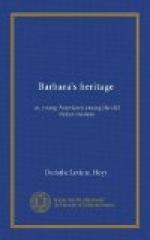“Nowhere, however, do we see the waiting and the longing for the coming of the Redeemer more strikingly shown than in these families,—’Genealogy of the Virgin’ they are commonly called,—that are painted in the triangular spaces above the windows. Each represents a father, mother, and little child, every bit of whose life seems utterly absorbed with just the idea of patient, expectant waiting. When troubled and weary, as we all are sometimes, you know, I have often come here to gain calmness and strength by looking at one or two of these groups;” and Mr. Sumner paused, with his eyes fixed on one of the loveliest of the Holy Families, as they are sometimes called, as if he would now drink in its spirit of hopeful peace.
“They are waiting,” he resumed after a few minutes, “as only those can wait who confidently hope; and, therefore, there is really nothing in the rendering of all this grand conception that more clearly points to the Saviour’s coming than do these.
“I think this part of the frescoes has not generally received the attention it merits.
“The decorative figures, called Athletes, that you see seated on the apparently projecting cornice, at each of the four corners of the smaller great divisions of the ceiling, are a wholly unique creation of the artist, and serve as a necessary separation of picture from picture. They are with reason greatly admired in the world of art.
“These many figures, each possessing distinct personality, were evolved from the mind of the artist. We can never think of him as going about through the city streets seeking models for his work as did Leonardo da Vinci. His figures are as purely ideal as the creations of the old Greeks. Now think of all this. Think of the sphere of the old master’s thought during these four years, and you will not wonder that he could not sleep, but, restless, came again and again at night with a candle fixed in his paper helmet to light the work of his hands.”
All were silent. Never before had they seen Mr. Sumner so evidently moved by his subject; and this made it all the more impressive. They became impatient as they heard a little group of tourists chatting and laughing in front of the Last Judgment; and when, finally, a crowd of travellers with a noisy guide entered the Chapel, they quickly decided to go away and to come again the next day.
“Thank you so much, Mr. Sumner,” said Barbara, in a low, sympathetic voice, as she found herself beside him as they came out through the long corridor; “you have made it all very plain to us,—the greatness, the skill, the patience of Michael Angelo. It is as if he had been inspired by God.”
“And why not?” was the gentle reply, as he looked down into the upturned face so full of sweet seriousness. “Do you believe that the days of inspiration were confined to past ages? God is the same as then, and close at hand as then; man is the same and with the same needs.




